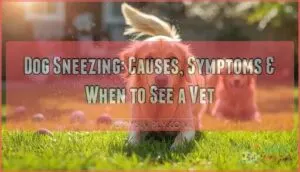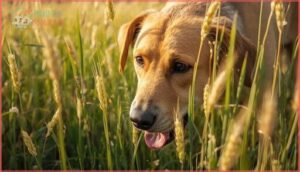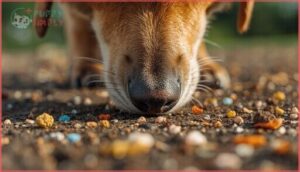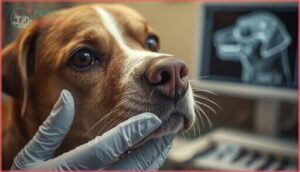This site is supported by our readers. We may earn a commission, at no cost to you, if you purchase through links.

While that adorable achoo might be your pup’s way of saying “we’re just playing,” persistent sneezing, nasal discharge, or blood-tinged mucus tells a different story. Knowing when sneezing is part of normal dog communication versus a sign your pet needs veterinary attention can help you protect your four-legged companion’s health before a small issue becomes a bigger problem.
Table Of Contents
- Key Takeaways
- Why Do Dogs Sneeze?
- Allergies and Environmental Irritants
- Infections That Cause Sneezing
- Nasal and Dental Health Issues
- Foreign Bodies in The Nose
- Recognizing Serious Sneezing Symptoms
- Diagnosing The Cause of Sneezing
- Treating Dog Sneezing
- Home Remedies and Prevention Tips
- Frequently Asked Questions (FAQs)
- Is it normal for puppies to sneeze a lot?
- How can I tell if my dog’s reverse sneezing is serious?
- What home remedies help relieve dog sneezing?
- Is sneezing dangerous or harmful for older dogs?
- Can dog sneezing spread to other pets?
- Do puppies sneeze more than adult dogs?
- Is sneezing linked to a dogs diet?
- Can anxiety or stress cause dog sneezing?
- How long does normal sneezing last?
- Conclusion
Key Takeaways
- Occasional sneezing during play is normal and often a friendly signal, but persistent sneezing, nasal discharge, or blood means your dog should see a vet.
- Allergies, infections, dental problems, and foreign objects are the most common medical causes of frequent sneezing in dogs.
- Keeping your home clean with pet-safe products and using air filters can help reduce allergy-related sneezing and keep your dog’s nose healthy.
- Signs like facial swelling, lethargy, vomiting, or difficulty breathing alongside sneezing are urgent red flags that need immediate veterinary attention.
Why Do Dogs Sneeze?
Dogs sneeze for many reasons, and most of the time it’s nothing to worry about. Sometimes it’s just part of how they play or communicate, while other times it signals an irritant in their nose or airways.
Let’s look at the most common reasons your dog might be sneezing and what each one means.
Common Causes of Sneezing
Your dog’s nose is like a radar system—it picks up everything. Sneezing happens when something irritates those sensitive nasal passages. Between 25% and 30% of dogs have some form of allergy, making environmental factors a leading trigger.
Here’s what commonly causes dogs to sneeze:
- Allergies: Pollen, dust, and mold spark reactions, especially in spring and fall.
- Infection: Viral, bacterial, or fungal infections cause sneezing with nasal discharge.
- Foreign body: Grass seeds or plant material get stuck in nasal passages.
- Breed predisposition: Flat-faced breeds like Pugs and Bulldogs sneeze more due to narrower airways.
- Environmental factors: Irritants in indoor and outdoor spaces trigger sneezing episodes.
Occasional sneezing is normal, but frequent episodes may indicate underlying canine allergies.
Play Sneezing and Communication
When your pup lets out a soft “achoo” during playtime, it’s not allergies—it’s intentional communication. Play sneezing acts as a calming signal, telling other dogs, “I’m just having fun, not fighting.” Behavioral studies show this gentle sneeze differs from irritant-based sneezing, appearing most often in active breeds during social play. As a deliberate communication tool, dogs use social cues like sneezing to interact.
Around 70% of toy and active breeds use play sneezing as a social cue. It’s part of your dog’s evolutionary toolkit—African wild dogs even use group sneezing for decision-making. Watch for relaxed body language alongside the sneeze; that confirms it’s behavioral, not a health concern. This dog play behavior reinforces friendly intentions and prevents misunderstandings in social contexts.
Play sneezing is a social signal in dogs—70% of toy breeds use it to communicate friendly intentions during interaction
| Play Sneezing Signal | What It Means |
|---|---|
| Soft, short sneeze | “This is friendly play” |
| During roughhousing | De-escalation signal |
| With wagging tail | Excitement and joy |
| Group play context | Maintaining harmony |
| Eye contact included | Inviting interaction |
Reverse Sneezing in Dogs
Reverse sneezing sounds alarming—rapid, honking inhalations like your dog can’t catch their breath—but it’s usually harmless. These upper airway spasms affect over half of all dogs, with toy breeds under 5 kg most prone due to their compact anatomy.
Chronic episodes lasting beyond three months warrant diagnostic imaging to rule out breathing problems. Reverse triggers include excitement, irritants, and tight collars, though most respiratory issues resolve without intervention.
Allergies and Environmental Irritants
Just like people, dogs can sneeze when they’re exposed to things in the air that irritate their noses. Pollen, dust, mold, and other particles floating around your home or yard can trigger sneezing fits in sensitive dogs.
Let’s look at the most common environmental triggers and what you can do to help your dog breathe easier.
Pollen, Dust, and Mold
Just like you might sneeze around spring flowers, your dog can react to environmental allergens too. Pollen sensitivity affects 10-25% of dogs with allergies, while dust mites trigger reactions in nearly half of allergic pets. Mold allergies are surprisingly common, with over two-thirds of affected dogs showing positive reactions.
These allergens cause sneezing, itchy skin, and respiratory symptoms. Air filters and proper diagnostic approaches help identify specific triggers.
Seasonal Allergies in Dogs
Throughout spring and fall, seasonal allergies affect up to 30% of dogs. You’ll notice allergy symptoms like sneezing, itchy skin, and inflammation when pollen levels peak.
Certain breeds—including Retrievers, Terriers, and Bulldogs—face higher breed predisposition to environmental allergies. Allergy testing through skin or blood work pinpoints specific triggers.
Treatment options range from antihistamines to immunotherapy, with home management strategies providing additional relief.
Identifying and Reducing Irritants
In homes where cleaning products and scented candles fill the air, household irritants trigger sneezing in over 60% of dogs. Improving air quality protects your dog from airborne irritants that cause respiratory distress.
- Replace ammonia-based cleaners with pet-safe alternatives to reduce irritant exposure by 29%
- Install HEPA air filters to eliminate up to 90% of allergens and improve allergen reduction
- Monitor symptoms during and after cleaning—67% of sneezing episodes link directly to chemical exposure
- Keep humidity levels balanced with a humidifier to ease nasal irritation
- Vacuum regularly with HEPA-equipped cleaners to cut dust and pollen by 60%
Monitoring symptoms helps you identify which environmental allergies affect your dog most.
Infections That Cause Sneezing
When your dog sneezes more than usual, an infection might be the culprit. Viruses, bacteria, and fungi can all irritate your dog’s nasal passages and trigger persistent sneezing.
Let’s look at the most common infections that cause this problem.
Viral Infections (e.g., Canine Influenza)
Viral respiratory infections can trigger frequent sneezing in your dog. Canine influenza, for instance, spreads quickly through kennels and dog parks, with CIV seroprevalence ranging from 2.47% to 11.06% annually.
Outbreak dynamics show 80% of exposed dogs develop canine influenza symptoms like coughing, nasal discharge, and fever. Vaccination trends remain low despite economic impacts on shelters.
Contact your veterinarian if sneezing persists beyond a few days.
Bacterial Infections
Bacterial infections in dogs often develop after viral illnesses weaken their defenses. Over half of dogs with suspected respiratory infections test positive for bacteria, with common culprits including:
- Bordetella bronchiseptica (primary pathogen worldwide)
- Pasteurella species (23.5% of isolates)
- Mycoplasma species
- E. coli (12.4%)
- Staphylococcus species (9.3%)
Co-infections occur in nearly 48% of cases. Antimicrobial resistance complicates treatment, making diagnostic approaches like bacterial culture essential before starting antibiotics.
Fungal Infections (e.g., Aspergillosis)
Fungal infections like Aspergillosis don’t get as much attention as viral or bacterial causes, but they’re serious business. Aspergillus species invade your dog’s nasal cavity, causing persistent sneezing and bloody discharge.
German Shepherds and Retrievers face higher breed predisposition due to environmental factors.
Diagnosis methods include endoscopy and fungal culture.
Treatment options involve antifungal medicines—often combining topical and oral therapy for the best results.
Nasal and Dental Health Issues
Your dog’s sneezing might point to problems hiding in places you wouldn’t expect—like their nasal passages or even their teeth. Issues with the nose and mouth can trigger persistent sneezing that won’t quit on its own.
Let’s look at three key health concerns that could be behind those frequent sneezes.
Rhinitis and Sinusitis
Chronic rhinitis affects the nasal passages, causing persistent sneezing and nasal discharge in your dog. About 24% of persistent nasal disease cases involve nonspecific rhinitis.
You’ll notice symptoms like mucopurulent nasal discharge in 95% of cases, often lasting two months or more. Sinus infections can accompany rhinitis, creating upper airway infection and nasal congestion.
Diagnostic imaging helps identify the problem, and treatment options include medications or targeted interventions.
Periodontal Disease and Tooth Root Abscesses
Your dog’s dental health connects directly to sneezing problems. Periodontal disease affects 80-90% of dogs over three, and untreated cases can lead to tooth root abscesses. These dental issues cause facial swelling and nasal discharge that trigger sneezing.
Treatment costs range from $800 to $3,000, but preventative care like regular brushing and twice-yearly vet checks greatly reduces your dog’s risk of developing these painful dental problems.
Nasal Tumors and Growths
Just as dental problems can trigger sneezing, nasal tumors and growths are another cause you shouldn’t ignore. These can be malignant, especially in older or long-nosed breeds, and often show up as:
- Persistent nasal discharge or bleeding
- Facial swelling or deformity
- Reduced survival rates without prompt treatment
Diagnostic imaging helps pinpoint nasal cancer, guiding your vet’s treatment options.
Foreign Bodies in The Nose
Dogs are naturally curious, and sometimes that nose-to-the-ground exploration leads to trouble. Grass seeds, twigs, and small debris can easily lodge in your dog’s nasal passages during outdoor adventures.
Let’s look at the most common foreign objects that cause sneezing and what you should watch for.
Grass Seeds and Plant Material
During grassy adventures, your dog can inhale foreign material like foxtails and grass awns. These barbed awns cause nasal discharge and migrate deeper into the nasal cavity. Seed infiltration risks spike in late spring and summer when wild barley and oats scatter seeds. Detection challenges arise because seeds don’t show on X-rays. Removal outcomes improve with ultrasound guidance—84% success rate.
Seasonal prevention includes checking your dog’s nose after outdoor walks.
| Risk Factor | Prevention Strategy |
|---|---|
| Tall, unmown grass | Avoid peak seed season walks |
| Long-coated breeds | Regular grooming after outings |
| Summer months | Inspect nasal passages, ears, paws |
Small Objects and Debris
Just like seeds, everyday Inhaled Fragments—think bits of broken toys, pebbles, or fabric—can sneak into your dog’s nose. Larger breeds and outdoor explorers face higher Risk Factors for foreign objects in dogs noses.
These Object Types often come from digging or sniffing around. Quick Removal Methods and attentive Post-Removal Care usually resolve sneezing once the foreign material is out.
Signs and Removal Procedures
When foreign material lodges in your dog’s nose, you’ll notice distinct Sneezing Indicators:
- Sudden violent sneezing that won’t quit—often the first red flag
- One-sided nasal discharge that may turn bloody or thick
- Pawing at the nose as your pup tries to dislodge the object
Diagnosing dog sneezing from a nasal foreign body generally requires Diagnostic Imaging like X-rays. Your vet will use Removal Instruments during rhinoscopy, though Surgical Options exist if needed. Post-Op Care includes antibiotics and monitoring.
Recognizing Serious Sneezing Symptoms
Most sneezing in dogs is harmless, but certain warning signs mean it’s time to call your vet.
When sneezing comes with other symptoms, it can point to infections, blockages, or more serious health problems. Watch for these red flags that need professional attention.
Nasal Discharge and Bleeding
If your dog’s sneezing comes with nasal discharge, pay attention to what you’re seeing. Clear discharge often points to allergies, but cloudy, yellow, or green discharge signals infection.
Nosebleeds in dogs deserve immediate concern—they appear in 40% of persistent nasal disease cases. Bleeding often indicates trauma, nasal tumors, or systemic disorders like clotting problems, especially in dogs over 10 years old.
Swelling or Facial Asymmetry
When your dog’s face looks uneven or puffy alongside sneezing, something serious might be happening. Swelling around the muzzle, eyelids, or jaw occurs in 40% of cases involving asymmetry—often pointing to dental abscesses, nasal tumors, or trauma impact.
Watch for these symptoms:
- Pronounced one-sided puffiness
- Redness and warmth in swollen areas
- Pain when you touch their face
- Difficulty eating or chewing
Allergic reactions cause over 60% of sudden facial swelling cases requiring emergency veterinary care, while dental problems account for 30% of recurring issues. Neurological problems, including stroke or facial nerve paralysis, create visible asymmetry in 75% of affected dogs. Don’t wait—contact your veterinarian immediately if you notice facial changes with sneezing.
Lethargy, Vomiting, or Loss of Appetite
When sneezing pairs with lethargy, vomiting, or loss of appetite, your dog’s immune system is waving a red flag. These concurrent symptoms appear together in 28.4% of cases involving respiratory and digestive issues—signaling infectious diseases like leptospirosis or canine parvovirus. Veterinary guidelines recommend evaluation within 8–12 hours when you notice these clinical patterns, as severity outcomes worsen rapidly without proper diagnostic significance and treatment intervention.
| Warning Sign | What It Means |
|---|---|
| Lethargy + sneezing | Possible systemic infection |
| Vomiting + no appetite | Multi-system involvement likely |
| All three together | Immediate veterinarian visit needed |
| Gagging or hypersalivation | Upper tract abnormality (7.7% of cases) |
| Weight loss + fever | Late infectious disease stage |
Diagnosing The Cause of Sneezing
When your dog’s sneezing becomes a regular concern, your veterinarian will need to play detective to figure out what’s going on.
The process starts with a thorough exam and conversation about your dog’s health history. From there, your vet may recommend specific tests to get a clearer picture of what’s causing the problem.
Veterinary Examination and History
When you bring your sneezing dog to the vet, you’re starting a detective process. Your veterinarian will begin by taking a detailed history—asking about when the sneezing started, how often it happens, and what triggers you’ve noticed. They’ll want to know about your dog’s environment, recent travel, and exposure to other animals.
Physical findings come next, as the vet examines your dog’s nasal passages, teeth, throat, and chest. Communication practices matter here: sharing even small details helps guide diagnostic selection.
This thorough medical examination, combined with knowing breed predispositions, helps your veterinarian narrow down possible causes and decide which diagnostic tests might be needed.
Diagnostic Tests (X-rays, Endoscopy)
Once your veterinarian suspects something deeper, diagnostic tests provide the real answers. X-rays reveal bone changes, masses, and soft tissue abnormalities in the nasal cavity. Computed tomography offers greater diagnostic accuracy—reaching 88% sensitivity for aspergillosis detection compared to radiography’s 72%.
Endoscopy, or rhinoscopy, gives your vet direct visualization inside nasal passages. Rhinoscopy benefits include immediate foreign body removal with 100% retrieval success rates. Studies show 97.1% of dogs experience complete symptom resolution after endoscopic extraction.
| Imaging Modalities | Sensitivity | Best Use |
|---|---|---|
| Radiography (X-rays) | 72–84% | Initial screening, bone trauma |
| CT Scan | 88–92% | Complex lesions, fungal infections |
| Rhinoscopy | Diagnostic + therapeutic | Foreign body retrieval, biopsies |
| Combined Imaging + Endoscopy | Highest yield | Persistent discharge, chronic cases |
| Nasofacial Radiographs | Moderate | Trauma, epistaxis evaluation |
Your veterinarian chooses tests based on symptoms and examination findings.
Treating Dog Sneezing
Once your vet identifies what’s causing your dog’s sneezing, they’ll recommend the right treatment to help your pup feel better. The approach depends entirely on the underlying issue—what works for allergies won’t fix a foreign object stuck in the nose.
Let’s look at the main treatment options your veterinarian might suggest.
Medications and Veterinary Treatments
When your dog’s sneezing needs medical attention, your veterinarian will choose treatments based on the underlying cause. Antibiotics tackle bacterial infections with proven efficacy, while antifungal medicines address fungal problems like Aspergillosis.
Anti-inflammatory use, including steroids, reduces nasal swelling and discomfort. For parasites, specific parasite treatments eliminate mites and worms effectively.
Allergy medications help manage environmental triggers, and surgical outcomes are generally positive for removing foreign bodies or correcting anatomical issues in veterinary care.
Addressing Underlying Conditions
Once medications are in place, it’s time to look at what’s fueling those sneezes. Autoimmune disorders, allergy management, dental interventions, and congenital defects all play a role. Breed predispositions can make some dogs more likely to need ongoing veterinary care.
Pinpointing the underlying medical condition through diagnosis means treatment can be customized, helping your dog breathe easier and feel better.
Surgery for Foreign Bodies or Tumors
When medications aren’t enough, surgery may be necessary. Rhinoscopic removal of nasal foreign bodies like grass awns succeeds in virtually all cases, with over 97% of dogs showing full recovery.
For nasal tumors, surgical methods often combine excision with radiation therapy. Costs range from $500 to $5,000 depending on complexity.
Potential complications include infection or recurrence, but long-term prognosis remains favorable with early intervention.
Home Remedies and Prevention Tips
You can do a lot at home to help your dog breathe easier and reduce sneezing episodes. Simple changes to your environment and a few supportive remedies can make a real difference.
Here’s what works best to keep your dog comfortable and when you should reach out to your vet instead.
Humidifiers and Steam Therapy
If your dog’s sneezing from dry air or congestion, a cool-mist humidifier can work wonders. Aim for humidity between 40% and 60% to keep nasal passages moist.
Steam therapy from a hot shower also helps—just let your pup breathe the moist air for 5 to 10 minutes. These home remedies for dogs ease breathing, especially in brachycephalic breeds with narrow airways.
Allergy Supplements and Probiotics
For dogs with allergies, supplements can offer relief—but not all products deliver on their promises. Look for these essentials:
- Omega-3 fatty acids at research-backed doses (50-220 mg EPA per kg body weight daily) reduce inflammation and improve skin health
- Probiotic strains like Lactobacillus rhamnosus support immune function and decrease allergen reactions
- Quality-tested brands with accurate label claims—73% of probiotic supplements fail to meet their stated potency
Clinical improvements generally appear within 4-8 weeks.
Keeping The Environment Clean
From dust mites to mold spores, airborne irritants can turn your home into a sneeze zone. Regular cleaning with pet-safe cleaners, using air purifiers, and washing bedding weekly help control allergens and prevent pest infestation. Skip strong air fresheners and harsh household cleaners—they often do more harm than good.
| Tip | Benefit |
|---|---|
| Dust mite control | Reduces sneezing |
| Air purifier benefits | Limits irritants |
| Pet-safe cleaners | Prevents reactions |
| Mold spore prevention | Protects breathing |
When to See a Veterinarian
When should you hit pause and call the vet? Persistent sneezing lasting over 24 hours, bloody discharge, facial swelling, or lethargy signal diagnostic urgency. Emergency symptoms like breathing difficulty demand immediate attention.
Brachycephalic breeds face higher risks due to breed predispositions.
Veterinary care for dogs experiencing these signs ensures early detection and better outcomes—preventative care beats waiting when respiratory health’s at stake.
Frequently Asked Questions (FAQs)
Is it normal for puppies to sneeze a lot?
Yes, occasional puppy sneeze frequency is typical. Playful sneeze signals during romps show excitement, while reverse sneezing commonality affects over half of dogs.
However, persistent dog sneezing in puppies warrants veterinary advice for dogs immediately.
How can I tell if my dog’s reverse sneezing is serious?
If you notice frequent episodes, breathing difficulty, nasal discharge, or behavioral changes like anxiety or lethargy during reverse sneezing, these symptoms may signal underlying conditions or breathing distress.
It’s time to seek veterinary advice for your dog.
What home remedies help relieve dog sneezing?
Home remedies like steam therapy, saline nasal spray, and cool-mist humidifiers can help clear your dog’s nasal passages.
Air purifiers reduce allergens, while dietary changes and allergy supplements support immune health and reduce inflammation.
Is sneezing dangerous or harmful for older dogs?
Think of sneezing like a smoke alarm—it’s not the alarm itself that’s dangerous, but what triggers it.
In older dogs, persistent sneezing often signals underlying conditions like nasal tumors or fungal infections requiring veterinary attention.
Can dog sneezing spread to other pets?
Respiratory infections like canine influenza and kennel cough spread dog-to-dog through sneezing droplets. Cats can catch certain bacteria, but zoonotic potential to humans is minimal.
Isolation prevents outbreak risks in multi-pet homes.
Do puppies sneeze more than adult dogs?
Puppies sneeze more than adult dogs due to their developing nasal passages, higher play frequency, and curious exploratory behavior.
Puppy immunity is lower, making them more susceptible to infections and foreign bodies, which can increase dog sneezing symptoms.
Is sneezing linked to a dogs diet?
Sneezing in dogs can be linked to diet, especially with food allergy sneezing. Common dietary allergens like chicken, beef, or dairy can trigger nasal symptoms.
Nutrients support lung health, and switching to a hypoallergenic diet may help.
Can anxiety or stress cause dog sneezing?
Could your dog’s nerves be triggering that sudden sneeze? Yes—anxiety can lead to stress-induced rhinitis or psychogenic reverse sneezing.
Stress immune modulation increases nasal inflammation, creating behavioral nasal signs.
Consult your veterinarian if symptoms persist.
How long does normal sneezing last?
Most dogs complete a single sneeze in under one second—it’s a quick reflex. Multiple sneezes might happen in bursts, but each one stays brief.
Play sneezing can continue intermittently throughout active sessions.
Conclusion
Like Sherlock Holmes with a magnifying glass, paying close attention to dog sneezing reveals clues about your pet’s health. A playful sneeze is usually nothing to worry about, but changes in frequency, discharge, or behavior deserve your attention.
Trust your instincts—if something feels off, don’t hesitate to call your vet. Your dog relies on you to notice small signals before they become big problems. Staying observant keeps the bond strong, and your dog’s nose happily twitching.
- https://pmc.ncbi.nlm.nih.gov/articles/PMC9782110/
- https://www.sciencedirect.com/science/article/pii/S0034528823001522
- https://www.doylestownveterinaryhospital.com/blog/help-my-dog-wont-stop-sneezing/
- https://www.avma.org/resources-tools/pet-owners/petcare/canine-infectious-respiratory-disease-complex-kennel-cough
- https://www.frontiersin.org/journals/veterinary-science/articles/10.3389/fvets.2017.00104/full
















